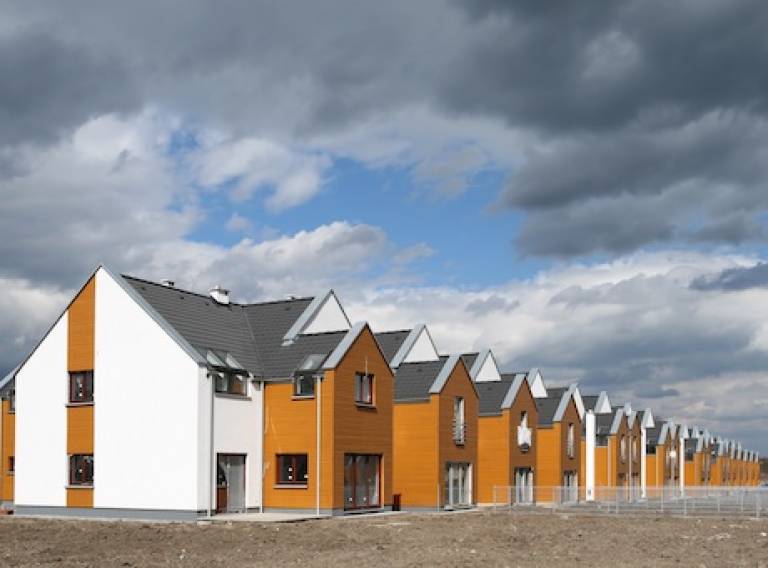'Retrofitting can cut carbon emissions in homes by at least half' new report finds
23 November 2012

The Institute for Sustainability and UCL Energy Institute (UCL-Energy) has produced ‘Retrofit Insights: perspectives for an emerging industry’, the first independent analysis of the UK’s leading domestic retrofit demonstrators; the Technology Strategy Board’s £17 million ‘Retrofit for the Future’ (R4tF) programme.
The findings help address key issues such as fuel poverty, rising energy bills, carbon emissions reduction targets, jobs and growth and innovation in the UK’s housing stock. Crucially, they address how the sector can tap into a potential £500 billion retrofit market while ensuring the best outcomes for householders.
The results highlight many of the practical problems and challenges – technical and behavioural – faced by retrofit teams in real world projects and help tackle some of the major confidence issues preventing the UK from retrofitting at the rate necessary to achieve the government’s target of an 80% reduction in carbon emissions from buildings by 2050.
The analysis is based on outcomes of selected retrofit projects in London from the Technology Strategy Board’s R4tF programme, covering a broad range of qualitative content highlighting many of the potential issues and benefits of domestic retrofit.
Eight projects consisting of 10 homes were selected from the 25 retrofit projects funded by the R4tF programme in the London area. House types in the sample included semi-detached, detached and terraced properties built between the late 19th and late 20th centuries. Households were selected by the Institute for social and economic diversity.
The result is a holistic, practical assessment of what the success factors are for domestic property retrofit: from how the project is managed, to how occupants are included in the process. It also illustrates the need for greater integration within retrofit teams and actions to strengthen supply chains for materials and systems.
Institute for Sustainability Chief Executive, Ian Short commented: “This initial analysis of the ‘Retrofit for the Future’ programme is an important step forward in understanding how national carbon reduction targets can be met in a way that creates value and improves quality of life for householders. The findings identify a number of areas where focus and investment could help scale up domestic retrofit to the levels needed. These include supply chain capacity, occupant engagement and retrofit project management practices.”
The full findings will be officially launched on 6 December 2012 at an event hosted by the Institute for Sustainability.
Ian Meikle, who leads the Technology Strategy Board's work on Low Impact Buildings, said:
"This extremely valuable report shows the real benefits of retrofitting to house owners and occupiers, and it provides a taster for the detailed analysis and data from the whole Retrofit for the Future programme that the Technology Strategy Board will release next Spring.
"It also helps to highlight that innovative UK companies can grow – and help grow the UK economy – by developing technologies that will enable them to exploit the lucrative and growing retrofit market."
Key findings include:
· Successful retrofits appear to support higher internal temperatures and levels of comfort, and generate high and in some cases very high levels of occupant satisfaction
· The supply chains needed to support large-scale retrofit are currently underdeveloped and more work is required to create capacity. There is both a lack of experienced retrofit practitioners and difficulty in sourcing the products and technologies required. Both areas represent significant opportunities for the industry and would be aided by further trials at whole street and neighbourhood scale that build on the experience of the R4tf programme
· Better integrated project teams were more likely to be successful - they engaged and communicated better with occupants, implemented better design solutions, managed occupant expectations of disruption more effectively, and produced better handover information. They were also better at supporting and building in learning to the process for the project team and its members
· High levels of “problem retrofits” are very likely to impact adversely on the occupant experience and produce low satisfaction levels. This could prejudice the rollout of domestic retrofit nationally.
· The costs of deep retrofit are, at present, significantly more than the likely limits on expenditure under the Green Deal, however, costs will reduce significantly as the scale of retrofit delivery ramps up, stimulating new economies and up-skilling in supply chains. Payback measurement does not consider other values such as improved quality of life for occupants, value added to the property and better health outcomes. It is also important to note that optimal cost of the retrofit was not the primary goal of the project which was set up to encourage innovative, collaborative 'whole house' design delivering deep, 80% carbon reductions far beyond current UK practice.
News courtesy of the Institute for Sustainability
Article on 'Green Build News'
 Close
Close

